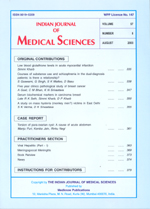
|
Indian Journal of Medical Sciences
Medknow Publications on behalf of Indian Journal of Medical Sciences Trust
ISSN: 0019-5359
EISSN: 0019-5359
Vol. 60, No. 8, 2006, pp. 311-317
|
 Bioline Code: ms06045
Bioline Code: ms06045
Full paper language: English
Document type: Research Article
Document available free of charge
|
|
|
Indian Journal of Medical Sciences, Vol. 60, No. 8, 2006, pp. 311-317
| en |
COMPARISON OF PERINATAL OUTCOME OF GROWTH-RESTRICTED FETUSES WITH NORMAL AND ABNORMAL UMBILICAL ARTERY DOPPLER WAVEFORMS
Malhotra Neena, Chanana Charu, Kumar Sunesh, Roy Kallol, Sharma JB
Abstract
AIMS : To evaluate the role of umbilical artery Doppler in growth- restricted fetuses.
MATERIALS AND METHODS: In a prospective observational study, 70 pregnant women with growth-restricted fetuses confirmed by ultrasound, were followed up with Doppler studies of the umbilical artery. The study group consisted of 35 women, where the Doppler waveform in the umbilical artery was compromised (either absent end diastolic flow [AEDF] or reversed end diastolic flow [REDF]). These were compared with an equal number of controls, where growth- restricted fetuses had normal doppler waveforms. Outcome measures were evaluated in both groups and analyzed.
RESULTS: The periods of gestation at delivery were 27.2 ± 3.5 weeks in group 1 and 37 ± 3.3 weeks in-group II, respectively. Perinatal morbidity and mortality was significantly increased in the group with compromised umbilical artery blood group. Birth weight in group I was 742 ± 126 grams and in group II was 1680 ± 259 grams. This difference was statistically significant (P=0.0001). In comparison to AEDF, REDF fetuses had more morbidities. Perinatal mortality was also significantly increased in this group (P=0.001).
CONCLUSION: Umbilical artery Doppler should be used in the management of growth-restricted fetuses. In those fetuses in normal Doppler, pregnancy can be prolonged. REDF is an indication for termination of pregnancy.
Keywords
Pregnancy outcome, ultrasonography, prenatal, blood flow velocity, fetal growth retardation
|
| |
© Copyright 2006 Indian Journal of Medical Sciences.
Alternative site location: http://www.indianjmedsci.org/
|
|
